
Nothing better illustrates the problems endemic to this kind of approach to history as re-creation, or recreation, than the current passion for Civil War reenactments. The real war was certainly about slavery, race, and fear. But Civil War reenactors convert this into a story about heritage, courage, and valor. With its intense focus on the historical accuracy of costumes, weaponry, and troop movements, this recreational form of history gives its participants and audiences a powerful sense of authenticity. The result is a pleasant, even exciting excursion to “the past, a more authentic time,” to quote a Union soldier I recently met. But this only ignores the unseemly legacies of slavery, race, and fear and, by actively ignoring them, only encourages their perpetuation into the future. In short, “living history” does not lead to deeper understandings of the past, nor does it let us see how the past shapes our world—it too often leads to shallow escapes from the deep historical problems of the present.
—MARK SPENCE, in Lewis and Clark, 2004